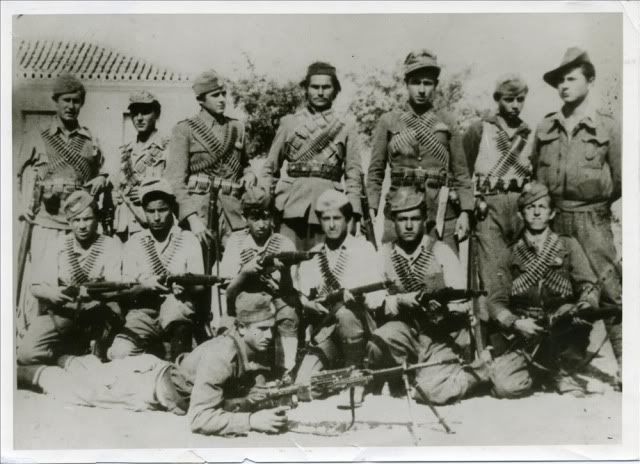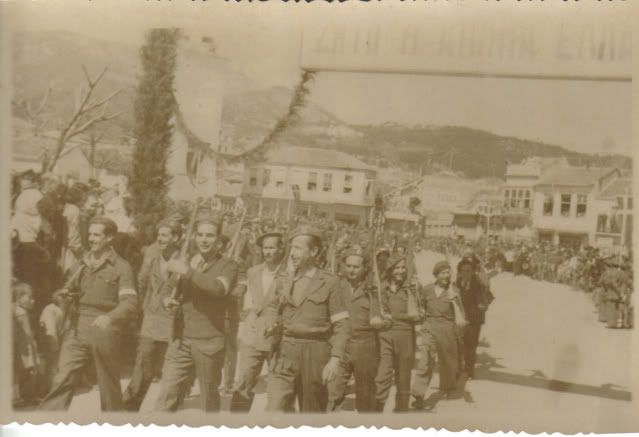Hi all!
I would like to share a rare piece of history, which belongs to my family since 1945. It's my grandfather's discharge paper from ELAS (Peoples' National Liberational Army), the partisan army of EAM (National Liberational Front), during the years of occupation of Greece in WW2.
The discharge paper was thought to have been lost, but has been found some time ago. My grandfather passed away 22 years ago, when I was too young to have the chance to talk with him about his experience from the war. I didn't have much info on it from my family either, since he didn't discuss about these years.
Looking at the info of the document, I realized that it is a rare piece of history. My grandfather joined the Reserves of ELAS in July 1943, aged 21, and the "Active" ELAS as a machine gunner in May 1944. Judging from his later unit, he must have joined the 5th Brigade, which got reorganized to the 2nd Division in September 1944, active in the areas of Attica and Viotia (most important battle the one in Karutes, against the SS-Polizei Gebirgsjaeger Regiment 18) and took part in the Battle of Athens in December of the same year. He belonged to the 1st Battalion of the 34th Regiment of the Division, which fought in the areas of the Goudi camp, "Sotiria" hospital, the Gendarmerie academy of "Makriyanni" and hotel "Cecil", where the RAF HQ was located.
The discharge paper is signed by the CO of the 1/34, "Kapetanios" Georgios Boutsinis, nicknamed "Nikitas", on February 22, 1945, after the Treaty of Varkiza, which predicted -among other things- the disbanding of ELAS. Not many discharge papers are left, since after the Battle of Athens and the Civil War, having fought in the ranks of ELAS and membership in the Communist Party could mean imprisonment or exile, so these were not kept.
My granfather's paper was kept hidden by his sister from 1948 to 1982, when the state recognised the left wing Resistance groups, offering a pension. He took it and kept it, not accepting the pension, saying that he did at the time what he felt to be his duty. After his death, he was awarded the National Resistance medal.
Cheers, Giorgos
Obverse (Red lines added by me)
<a href="http://s614.photobucket.com/albums/tt226/stray_dog/?action=view¤t=apolytirio3.jpg" target="_blank"><img src="http://i614.photobucket.com/albums/tt226/stray_dog/apolytirio3.jpg" border="0" alt="Photobucket"></a>
Reverse
<a href="http://s614.photobucket.com/albums/tt226/stray_dog/?action=view¤t=apolytirio4.jpg" target="_blank"><img src="http://i614.photobucket.com/albums/tt226/stray_dog/apolytirio4.jpg" border="0" alt="Photobucket"></a>
I would like to share a rare piece of history, which belongs to my family since 1945. It's my grandfather's discharge paper from ELAS (Peoples' National Liberational Army), the partisan army of EAM (National Liberational Front), during the years of occupation of Greece in WW2.
The discharge paper was thought to have been lost, but has been found some time ago. My grandfather passed away 22 years ago, when I was too young to have the chance to talk with him about his experience from the war. I didn't have much info on it from my family either, since he didn't discuss about these years.
Looking at the info of the document, I realized that it is a rare piece of history. My grandfather joined the Reserves of ELAS in July 1943, aged 21, and the "Active" ELAS as a machine gunner in May 1944. Judging from his later unit, he must have joined the 5th Brigade, which got reorganized to the 2nd Division in September 1944, active in the areas of Attica and Viotia (most important battle the one in Karutes, against the SS-Polizei Gebirgsjaeger Regiment 18) and took part in the Battle of Athens in December of the same year. He belonged to the 1st Battalion of the 34th Regiment of the Division, which fought in the areas of the Goudi camp, "Sotiria" hospital, the Gendarmerie academy of "Makriyanni" and hotel "Cecil", where the RAF HQ was located.
The discharge paper is signed by the CO of the 1/34, "Kapetanios" Georgios Boutsinis, nicknamed "Nikitas", on February 22, 1945, after the Treaty of Varkiza, which predicted -among other things- the disbanding of ELAS. Not many discharge papers are left, since after the Battle of Athens and the Civil War, having fought in the ranks of ELAS and membership in the Communist Party could mean imprisonment or exile, so these were not kept.
My granfather's paper was kept hidden by his sister from 1948 to 1982, when the state recognised the left wing Resistance groups, offering a pension. He took it and kept it, not accepting the pension, saying that he did at the time what he felt to be his duty. After his death, he was awarded the National Resistance medal.
Cheers, Giorgos
Obverse (Red lines added by me)
<a href="http://s614.photobucket.com/albums/tt226/stray_dog/?action=view¤t=apolytirio3.jpg" target="_blank"><img src="http://i614.photobucket.com/albums/tt226/stray_dog/apolytirio3.jpg" border="0" alt="Photobucket"></a>
Reverse
<a href="http://s614.photobucket.com/albums/tt226/stray_dog/?action=view¤t=apolytirio4.jpg" target="_blank"><img src="http://i614.photobucket.com/albums/tt226/stray_dog/apolytirio4.jpg" border="0" alt="Photobucket"></a>




Comment